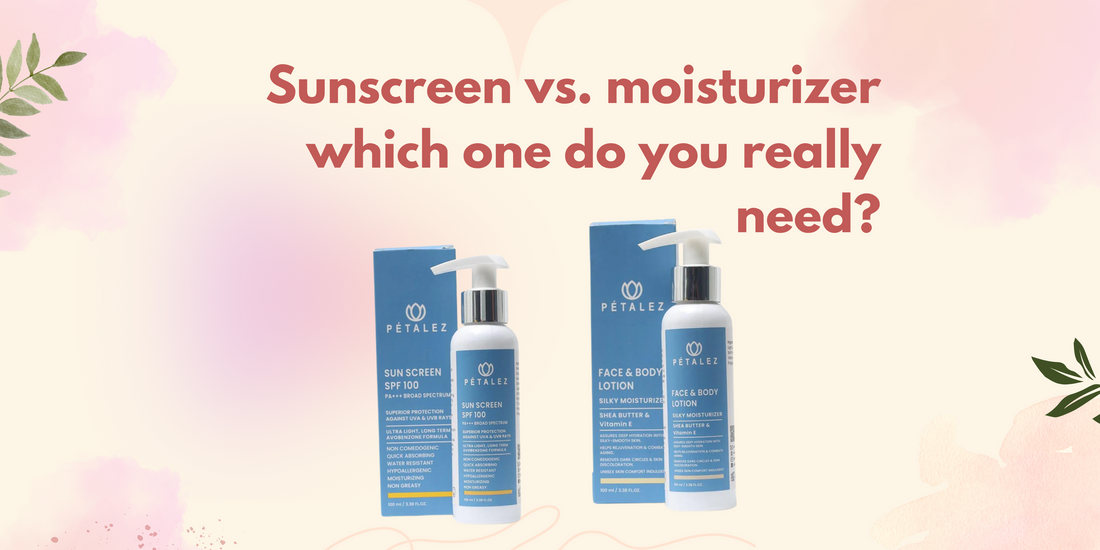
Sunscreen vs. moisturizer which one do you really need?
Share
Taking care of your skin matters. Whether you're heading outside or just staying indoors, your skin needs attention. Many people get confused about whether they should use sunscreen or moisturizer. The right choice can make your skin look better and last longer. In this article, you'll learn when and why you need sunscreen and moisturizer. This way, you can make better skincare decisions every day.
Understanding the Basics: What Are Sunscreen and Moisturizer?
What Is a Moisturizer?
A moisturizer is a product that helps keep your skin soft and smooth. It does this by trapping water in your skin or adding moisture directly. Moisturizers come in different forms like creams, lotions, gels, and oils. Some ingredients in moisturizers include:
- Humectants: draw water into the skin
- Occlusives form a barrier to prevent water loss
- Emollients: soften and smooth rough patches
Everyone's skin needs hydration, but the type of moisturizer you pick depends on your skin type.
What Is Sunscreen?
Sunscreen protects your skin from the sun’s harmful rays. Its main role is blocking UV rays, which can cause skin damage and even skin cancer. There are two main types:
- Chemical sunscreens: absorb UV rays and convert them to heat
- Physical (mineral) sunscreens: reflect UV rays away from your skin
Active ingredients like zinc oxide or titanium dioxide in physical sunscreens, and avobenzone or oxybenzone in chemical formulas, help provide UV protection. The goal of sunscreen is to shield your skin from UV damage and premature aging.
How Do Sunscreen and Moisturizer Work?
The Skin Barrier Explained
Your skin has a barrier that protects against dirt, bacteria, and UV rays. It also helps lock in water, keeping your skin hydrated. Moisturizers support this barrier by adding hydration and strengthening it over time. Sunscreens help by preventing UV rays from damaging your skin cells.
When and Why Each Is Needed
Moisturizers are best when your skin feels dry or sensitive. You might use a moisturizer after washing your face or to treat specific issues like eczema. Sunscreen is essential whenever you're exposed to the sun or spending time outdoors. To get the full benefit, many skincare routines combine both products—moisturize first, then apply sunscreen on top.
Common Misconceptions and Myths
Myth: You Only Need Sunscreen on Sunny Days
The truth is, UV rays can pass through clouds or reflect off surfaces like sand and snow. Even on cloudy days, UV exposure can harm your skin. Don't skip sunscreen just because it's cloudy outside.
Myth: Moisturizers Alone Are Enough for Sun Protection
While moisturizers keep your skin hydrated, they don’t protect against UV rays unless they have SPF. Relying only on moisturizer can leave you unprotected from sun damage.
Myth: Sunscreens Are Only for Fair Skin or Outdoors
Sunscreen is for everyone. Darker skin tones also get damaged by UV rays, and indoor UV exposure from screens and lighting can also harm your skin. Wearing SPF daily is a good habit for all skin types and tones.
Choosing the Right Product for Your Needs
Assessing Your Skin Type and Conditions
Is your skin oily, dry, sensitive, or prone to breakouts? Each needs a different kind of moisturizer or sunscreen. For dry skin, look for richer creams. For oily skin, gels or lightweight lotions work better. If you have skin conditions like rosacea or eczema, choose gentle formulas.
Selecting the Right Moisturizer
Pick a moisturizer with ingredients suited to your skin. For hydration, focus on humectants. For dry patches, occlusives work best. If your skin is sensitive, avoid fragrances and harsh chemicals.
Selecting the Right Sunscreen
Consider SPF ratings—SPF 30 protects against 97% of UVB rays, SPF 50 blocks about 98%. Always choose broad-spectrum formulas that guard against UVA and UVB rays. Gel sunscreens are good for oily skin, while lotions suit dry skin.
Combining Both for Optimal Skin Health
Layer your skincare by applying moisturizer first, then sunscreen. Reapply sunscreen every two hours when outdoors. Don't forget to cover often overlooked areas like ears, neck, and hands for complete protection.
Expert Recommendations and Industry Guidelines
 Dermatologists agree that daily sun protection and proper hydration are keys to youthful, healthy skin. The American Academy of Dermatology recommends applying a broad-spectrum SPF 30 or higher sunscreen every day. Regular use of moisturizer improves skin's strength and resilience, reducing the effects of aging and environmental damage.
Dermatologists agree that daily sun protection and proper hydration are keys to youthful, healthy skin. The American Academy of Dermatology recommends applying a broad-spectrum SPF 30 or higher sunscreen every day. Regular use of moisturizer improves skin's strength and resilience, reducing the effects of aging and environmental damage.
Practical Tips and Actionable Advice
- Make sunscreen part of your morning routine, even if you stay indoors most of the day.
- Moisturize right after cleansing your face to seal in hydration.
- Remember to reapply sunscreen every 2 hours when outside.
- Match your skincare products to your skin type for the best results.
- Use sun-protective clothing and hats to boost your defense against UV rays.
Conclusion
Both sunscreen and moisturizer play vital roles in skin health. Moisturizer keeps your skin hydrated, while sunscreen protects against year-round UV damage. They work best when used together, forming a strong shield for your skin. Think about your skin’s needs and incorporate both into your daily routine. Prioritizing sun protection along with proper hydration helps you maintain healthier, younger-looking skin long-term.
FAQs: Sunscreen vs. Moisturizer
1. Can I use sunscreen as a moisturizer?
Some sunscreens contain hydrating ingredients (like hyaluronic acid or glycerin) and may provide light moisture. However, if you have dry skin, a separate moisturizer is best. For oily skin, a mattifying sunscreen with hydration might suffice.
2. Should I apply moisturizer or sunscreen first?
Always apply moisturizer first, followed by sunscreen. Moisturizers need to penetrate the skin, while sunscreen forms a protective barrier. Layering them out of order can reduce SPF effectiveness.
3. Do I need sunscreen if my moisturizer has SPF?
Moisturizers with SPF are convenient but often don’t provide enough coverage. You’d need ¼ teaspoon for the face to match the SPF on the label—most people underapply. For full protection, use a dedicated sunscreen.
4. Can I skip moisturizer if I have oily skin?
Even oily skin needs hydration! Skip heavy creams and opt for a lightweight, oil-free moisturizer (like a gel or serum). Dehydrated skin can overproduce oil, worsening shine.
5. Is sunscreen necessary indoors?
Yes! UVA rays penetrate windows and screens, causing premature aging. If you’re near windows or using devices for long periods, apply broad-spectrum SPF 30+.
6. What’s better for acne-prone skin: sunscreen or moisturizer?
You need both! Choose:
- A non-comedogenic moisturizer (e.g., with niacinamide).
- An oil-free, mineral sunscreen (zinc oxide is less irritating).
7. How often should I reapply sunscreen?
Every 2 hours if outdoors or sweating. For daily indoor use, apply once in the morning.
8. Can I mix sunscreen with moisturizer?
No! Mixing dilutes the SPF, reducing protection. Apply them separately or use a moisturizer with SPF (but reapply sunscreen if outdoors).
9. Which is more important: sunscreen or moisturizer?
Both are essential, but sunscreen is non-negotiable for preventing skin cancer and aging. Moisturizer supports skin health but doesn’t replace UV protection.
10. What’s the best sunscreen for sensitive skin?
Look for fragrance-free, mineral sunscreens with zinc oxide or titanium dioxide. Avoid chemical filters like oxybenzone, which can irritate.
11. Can I use night cream with SPF instead of sunscreen?
No. Night creams with SPF aren’t tested for daytime UV protection. Use a dedicated daytime sunscreen.
12. Does darker skin need sunscreen?
Yes! While melanin offers some protection, all skin tones are at risk for UV damage, hyperpigmentation, and skin cancer.
13. What’s the difference between physical and chemical sunscreens?
- Physical (mineral): Contains zinc/titanium dioxide; blocks UV rays immediately. Better for sensitive skin.
- Chemical: Absorbs UV rays; needs 20 minutes to activate. Lighter texture but may irritate some skin types.


